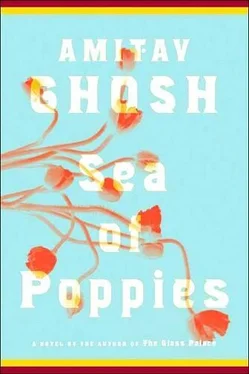Huzoor: Parimal appeared beside him, with a bag in hand. I have packed a few things – all that you will need.
Neel reached out in gratitude and squeezed his retainer's hands: all his life, Parimal had known exactly what he needed, often before he himself had known the want, but he had never felt as deeply indebted to him as he did now. He put out a hand to take the bag, but Parimal would not give it to him.
How can you carry your own luggage, huzoor? In front of the world's eyes?
The absurdity of this brought a smile to Neel's lips; he said: Do you know where they're taking me, Parimal?
Huzoor… Parimal lowered his voice to a whisper: If you but give the word, our men will fight back. You could escape… you could be concealed…
For a wild instant, the idea of escape lodged in Neel's mind – but only to vanish, as he recalled the map that hung in his daftar, and the red stain of Empire that had spread so quickly across it. Where would I hide? he said. The piyadas of Raskhali can't fight the battalions of the East India Company. No, there's nothing to be done.
Neel turned away from Parimal to step back into his daftar, where the Major was waiting for him, with a hand on the hilt of his sword. 'I am ready,' said Neel. 'Let us be done with this.'
Ringed by a half-dozen uniformed constables, Neel made his way down the stairs. When he stepped into the courtyard the voices of the white-clad women rose once again to a shriek and they threw themselves at the constables, trying to reach across their batons, to the prisoner. Neel held his head high, but he could not bring himself to meet their gaze; it was only when he was at the gates that he allowed himself to glance back. No sooner did he turn than his eyes met those of his wife, Malati, and it was as if he had never seen her before. The covers had dropped from her ever-veiled face, and she had torn open the bindings of her braids so that her hair lay on her shoulders like a dark shroud of grief. Neel stumbled and lowered his eyes; he could not bear for her to look at him; it was as if the uncovering of her face had stripped the veil from his own manhood, leaving him naked and exposed to the gloating pity of the world, to a shame that could never be overcome.
A covered hackney carriage was waiting in the lane outside and when Neel sat down in it, the Major took the seat opposite his. He was clearly relieved to have accomplished his end without violence, and as the horses began to move, he said, in a kinder tone than he had earlier used: 'I am sure it will all be sorted out quite soon.'
The carriage arrived at the end of the lane, and as it was turning the corner, Neel swivelled in his seat to take a last look at his house. He could see only the roof of the Raskhali Rajbari, and on it, outlined against the dimming sky, his son's head, leaning on a parapet, as if in wait: he recalled that he had said he would be back in ten minutes, and this seemed to him now the most unpardonable of all the lies in his life.
*
Ever since that night by the river, when Deeti had come to his help, Kalua had kept count of the days on which he was granted a glimpse of her, and the empty days in between. The tally was kept neither with any specific intention, nor as an expression of hope – for Kalua knew full well that between her and himself, none but the most tenuous connection could exist – yet the patient enumeration happened in his head whether he liked it or not: he was powerless to make it cease, for his mind, slow and plodding in some respects, had a way of seeking the safety of numbers. Thus it was that when Kalua heard of Deeti's husband's death, he knew that exactly twenty days had elapsed since that afternoon when she asked for his help in bringing Hukam Singh back from the opium factory.
The news came to him by chance: it was evening, and he was on his way back to his dwelling, in his cart, at the end of the day, when he was stopped by two men who were travelling on foot. Kalua knew they had come a long way because their dhotis were dark with dust and they were leaning heavily on their sticks. They held up their hands as he was passing by, and when his cart rumbled to a stop, they asked if he knew the dwelling of Hukam Singh, the former sepoy. I know it, said Kalua, and he pointed down the road and told them that to get there they would have to walk straight for two kos, and turn left after reaching a large tamarind tree. Then, after following a path through the fields for one hundred and twenty paces, they would have to turn left again, to walk another two hundred and sixty. The men were dismayed: It's almost dark, how will we find these paths? Just keep looking, said Kalua. And how long will it take? An hour, said Kalua, but maybe less.
The men began to plead with him to take them there in his cart: or they would be late, they said, and would miss everything. Late for what? Kalua asked, and the older of the two men said: For Hukam Singh's cremation and…
He was about to say something else, when his companion nudged him sharply with his stick.
Has Hukam Singh passed away? Kalua asked.
Yes, late last night. We set out as soon as we heard the news.
All right then, said Kalua. Come. I'll take you there.
The two men climbed on to the rear of the cart and Kalua shook his reins to set his oxen moving. After a good while had passed, Kalua inquired cautiously: And what of Hukam Singh's wife?
Let's see what happens, said the older man. Maybe we'll know tonight…
But here again he was interrupted by his companion and the sentence was never finished.
The oddly surreptitious behaviour of the two men set Kalua to wondering whether something untoward was under way. He made it his practice to think hard about everything he saw around him: as the cart rolled down the road, he asked himself why these men, who didn't know Hukam Singh well enough to be aware of the location of his dwelling, would come such a great distance to be present at his cremation. And why was the cremation to be near the dead man's home rather than in the cremation ghat? No: there was something in this that was out of the ordinary. Kalua became more and more convinced of this as they approached their destination – for he saw now that there were a great many others heading towards the same place, more than seemed likely to attend the funeral of a man like Hukam Singh, known by the world to be an incorrigible afeemkhor. When they reached the dwelling, his suspicions deepened, for he saw that the pyre was a great mound of wood, on the banks of the Ganga. Not only was it far larger than was necessary for the cremation of a single man, it was surrounded by a profusion of offerings and objects, as if it were being readied for some larger purpose.
It was dark now, and after the two travellers had alighted, Kalua tethered his oxcart in a field, some distance away, and returned on foot to the pyre. There were some hundred or so people there, and by listening to their conversations, he soon picked up the whispered sibilance of a word – 'sati'. It was all clear now: he understood. He made his way back, in the dark, to his tethered cart, and lay in it a while, to think through his next move. He thought slowly and carefully, examining the merits and drawbacks of several possible courses of action. Only one plan survived the winnowing, and when he rose to his feet again, he knew exactly what he had to do. First, he took the yoke off his oxen and freed them, to wander off along the riverbank: this was the most difficult part of all, for he loved those two animals as if they were his kin. Then, one nail at a time, he ripped the bamboo platform from the axle of his cart, and tied a rope tightly and securely around its middle. The platform was a large unwieldy object, but for Kalua the weight was negligible, and he had no trouble slinging it over his back. Keeping to the shadows, he crept along the river till he came to a sandbank that overlooked the pyre. He laid the bamboo platform on the sand and flattened himself on it, taking care to stay out of sight.
Читать дальше












